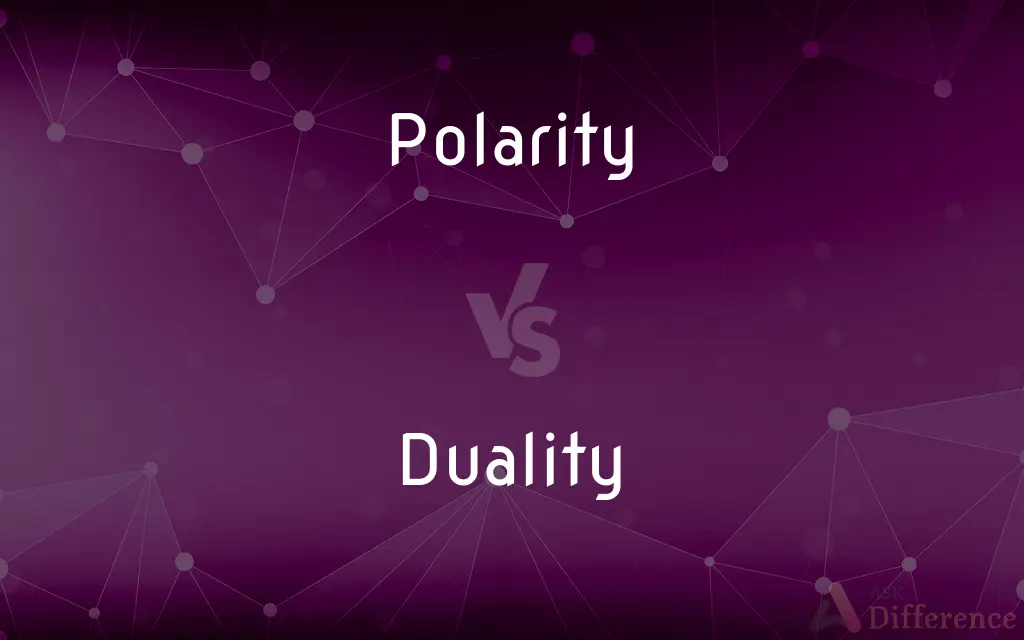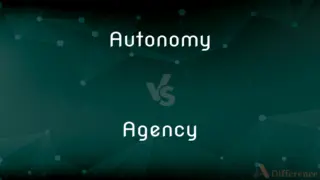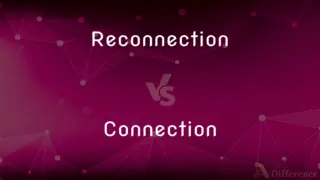Polarity vs. Duality — What's the Difference?
Edited by Tayyaba Rehman — By Urooj Arif — Updated on April 2, 2024
Polarity refers to the presence of two opposite characteristics or tendencies, essential in understanding contrasts like positive vs. negative. Duality, while similar, emphasizes the coexistence of two distinct, often complementary system or concept.

Difference Between Polarity and Duality
Table of Contents
ADVERTISEMENT
Key Differences
Polarity is about opposing forces or characteristics within a system, highlighting contrast and opposition, such as positive and negative charges in electricity. Duality, on the other hand, focuses on the concept of two parts or aspects that are fundamentally different yet interconnected, often seen in philosophical or spiritual contexts, like the yin and yang in Chinese philosophy.
Polarity is often used in contexts where two opposite qualities or tendencies are present and influence outcomes, like the magnetic or electrical poles. These opposites are usually in a state of conflict or tension. Duality, whereas, tends to be discussed in terms of complementary or interconnected pairs that together form a whole, suggesting a balance or harmony rather than conflict.
In terms of application, polarity is a concept widely used in science, especially in physics and chemistry, to describe properties such as electrical charge. Duality, on the other hand, finds its relevance in philosophy, spirituality, and sometimes in psychology, where it helps in understanding complex concepts like the human mind's conscious and subconscious aspects.
The understanding of polarity can lead to technological advancements and solutions, such as the development of batteries or the understanding of chemical bonds, due to its practical applications in the physical world. Duality, whereas, often provides a framework for exploring moral, ethical, and existential questions, offering insights into human nature, consciousness, and the universe's fundamental structure.
Comparison Chart
Definition
The presence of two opposite characteristics
The coexistence of two contrasting parts
ADVERTISEMENT
Context
Science (physics, chemistry)
Philosophy, spirituality
Nature
Oppositional
Complementary
Examples
Magnetic poles, electrical charges
Yin and yang, body and soul
Application
Technological advancements
Understanding of moral and existential issues
Compare with Definitions
Polarity
In physical phenomena.
Polarity in water molecules explains why water has such unique properties.
Duality
Coexistence of contrasts.
Duality in human nature refers to the simultaneous existence of good and evil within us.
Polarity
In electrical charges.
Polarity determines the direction of current flow in an electrical circuit.
Duality
In philosophical concepts.
The duality of mind and body has been a central debate in philosophy for centuries.
Polarity
Presence of opposites.
The concept of polarity is essential in understanding how magnets work.
Duality
In psychology.
The concept of duality is used to describe the conscious and subconscious aspects of the mind.
Polarity
In relationships.
The polarity between two individuals can sometimes lead to a dynamic and vibrant relationship.
Duality
In natural systems.
The duality of predator and prey is essential for maintaining ecological balance.
Polarity
In global perspectives.
Political polarity can often lead to increased tensions between different ideologies.
Duality
In spiritual beliefs.
Many religions talk about duality in terms of light and darkness representing moral opposites.
Polarity
Intrinsic polar separation, alignment, or orientation, especially of a physical property
Magnetic polarity.
Ionic polarity.
Duality
The quality or character of being twofold; dichotomy.
Polarity
An indicated polar extreme
An electric terminal with positive polarity.
Duality
A classification into two subclasses or opposed parts.
Polarity
The possession or manifestation of two opposing attributes, tendencies, or principles
Political polarity.
Duality
(projective geometry) The interchangeability of points and planes.
Polarity
The separation, alignment or orientation of something into two opposed poles.
Duality
The mathematical equivalence of two seemingly different theoretical descriptions of a physical system.
Polarity
Either of the two extremes of such attributes.
Duality
The quality or condition of being two or twofold; dual character or usage.
Polarity
(chemistry) The dipole-dipole intermolecular forces between the slightly positively-charged end of one molecule to the negative end of another or the same molecule. Wp
Duality
Being twofold; a classification into two opposed parts or subclasses;
The dichotomy between eastern and western culture
Polarity
(embryology) The division of an embryo into an animal pole and a vegetal pole within a blastula. Wp
Duality
(physics) the property of matter and electromagnetic radiation that is characterized by the fact that some properties can be explained best by wave theory and others by particle theory
Polarity
(microbiology) Spatial differences in shape, structure, and function within a cell. Wp
Duality
(geometry) the interchangeability of the roles of points and planes in the theorems of projective geometry
Polarity
(electricity) A measure of the electrical potential at the ends of a circuit. Wp
Polarity
(physics) The direction of a wave's amplitude or its being in phase or antiphase.
Polarity
(grammar) The grammatical category of the affirmative and the negative. Wp
Polarity
A duality that is an involution, i.e. has order two. Wp
Polarity
(mathematics) An indicator of the positivity or negativity of a literal. Wp
Polarity
(politics) Any of the various ways in which power is distributed within the international system. Wp
Polarity
(gender) The concept of dualism between masculine and feminine. Wp
Polarity
(physics) magnetic polarity
Polarity
(geometry) trilinear polarity
Polarity
That quality or condition of a body in virtue of which it exhibits opposite, or contrasted, properties or powers, in opposite, or contrasted, parts or directions; or a condition giving rise to a contrast of properties corresponding to a contrast of positions, as, for example, attraction and repulsion in the opposite parts of a magnet, the dissimilar phenomena corresponding to the different sides of a polarized ray of light, etc.
Polarity
A relation between two opposite attributes or tendencies;
He viewed it as a balanced polarity between good and evil
Polarity
Having an indicated pole (as the distinction between positive and negative electric charges);
He got the polarity of the battery reversed
Charges of opposite sign
Common Curiosities
How do polarity and duality differ?
Polarity emphasizes opposition and contrast, while duality focuses on complementary and interconnected aspects.
Can duality exist without polarity?
Yes, duality can exist without polarity as it involves complementary aspects, not necessarily opposites.
Is polarity more prevalent in science or philosophy?
Polarity is more prevalent in science, especially in physics and chemistry.
What is polarity?
Polarity refers to the existence of two opposite characteristics or tendencies within a system.
How does polarity affect relationships?
Polarity in relationships can lead to dynamic and vibrant interactions due to the presence of contrasting qualities.
How does polarity influence technological advancements?
Understanding polarity can lead to technological advancements by applying its principles in developments like batteries or electrical devices.
Why is duality significant in philosophical debates?
Duality is significant in philosophical debates as it offers a framework for exploring complex concepts like consciousness and morality.
Where is duality often discussed?
Duality is often discussed in philosophy, spirituality, and psychology.
What is duality?
Duality is the concept of two distinct, often complementary, parts or principles within a system or concept.
Can an individual exhibit both polarity and duality?
Yes, an individual can exhibit both polarity and duality, reflecting contrasting tendencies and the coexistence of complementary aspects within themselves.
What is an example of duality in nature?
The predator and prey relationship is an example of duality in nature.
How does the concept of polarity apply to electrical circuits?
In electrical circuits, polarity determines the direction of current flow.
What role does duality play in understanding human nature?
Duality helps in understanding the complex coexistence of contrasting aspects within human nature, like good and evil.
Can polarity lead to conflict?
Yes, the presence of opposing forces or tendencies in polarity can often lead to conflict.
Does duality imply balance?
Yes, duality often implies a balance or harmony between two interconnected aspects.
Share Your Discovery

Previous Comparison
Autonomy vs. Agency
Next Comparison
Reconnection vs. ConnectionAuthor Spotlight
Written by
Urooj ArifUrooj is a skilled content writer at Ask Difference, known for her exceptional ability to simplify complex topics into engaging and informative content. With a passion for research and a flair for clear, concise writing, she consistently delivers articles that resonate with our diverse audience.
Edited by
Tayyaba RehmanTayyaba Rehman is a distinguished writer, currently serving as a primary contributor to askdifference.com. As a researcher in semantics and etymology, Tayyaba's passion for the complexity of languages and their distinctions has found a perfect home on the platform. Tayyaba delves into the intricacies of language, distinguishing between commonly confused words and phrases, thereby providing clarity for readers worldwide.














































